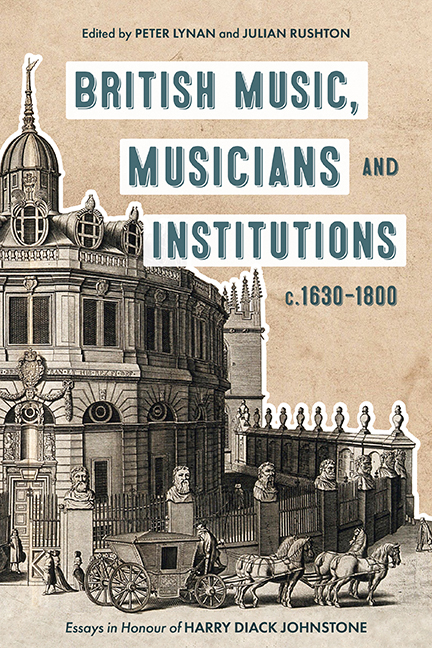Book contents
- Frontmatter
- Contents
- List of Illustrations
- List of Music Examples
- List of Contributors
- Acknowledgements
- List of Abbreviations
- Note to the Reader
- Introduction
- Part I Performers and Performance Style
- Part II Composers and Secular Institutions
- Part III Sacred Music and Institutions
- Part IV Dissemination: Copying, Printing, and Publishing
- Epilogue: Musica Britannica and the Eighteenth Century
- Harry Diack Johnstone: A Tribute
- Bibliography of the Publications of Harry Diack Johnstone
- Index
- Tabula Gratulatoria
12 - ‘You can’t have it of Smith except you’ll have it wrote out on Purpose’: Eighteenth-Century Copyists of Handel’s Music in London and the ‘Smith Scriptorium’
Published online by Cambridge University Press: 06 October 2022
- Frontmatter
- Contents
- List of Illustrations
- List of Music Examples
- List of Contributors
- Acknowledgements
- List of Abbreviations
- Note to the Reader
- Introduction
- Part I Performers and Performance Style
- Part II Composers and Secular Institutions
- Part III Sacred Music and Institutions
- Part IV Dissemination: Copying, Printing, and Publishing
- Epilogue: Musica Britannica and the Eighteenth Century
- Harry Diack Johnstone: A Tribute
- Bibliography of the Publications of Harry Diack Johnstone
- Index
- Tabula Gratulatoria
Summary
With nearly one hundred volumes of the Hallische Händel-Ausgabe now in print, and about thirty-five further volumes to follow until the project is (at least provisionally) complete, this is an appropriate moment to review the history of modern scholarship about the hands that wrote out Handel's music in the eighteenth century. The identification of music copyists is one essential task for the editor of any of Handel's works, since all relevant sources need to be examined in order to establish the date, content, and relative authority for each one; information about the scribal hands is complementary to the chronological information that may be discovered from musical content and from the characteristics of the paper itself – watermarks and stave-rulings.
Except where the composer was (or had to be) his own copyist, composers could not do without copyists when a substantial group of performers had to be provided for, and performances did not happen without them. There are stories of composers’ dissatisfaction with the services they received, as in the incident that Charles Burney recorded concerning a rehearsal for Judas Maccabaeus in 1747:
unfortunately, something went wrong, and HANDEL, with his usual impetuosity, grew violent: a circumstance very terrific to a young musician. – At length, however, recovering from my fright, I ventured to say, that I fancied there was a mistake in the writing; which, upon examining, HANDEL discovered to be the case: and then, instantly, with the greatest good humour and humility, said, “I pec your barton – I am a very odd tog: – maishter Schmitt is to plame.”
Copyists were also employed in situations that did not immediately relate to performances, especially for patrons who wanted library scores of unpublished works for Handel's music: their opportunities arose from the manuscript collections of his works that were formed by Elizabeth Legh, Charles Jennens, Bernard Granville, the Earl of Shaftesbury, James Hunter, and Frederick, Prince of Wales, during the composer's lifetime.
The context for the quotation which forms my title was, however, different again. In the spring of 1738 James Harris was planning a performance of Alexander's Feast at Salisbury, and he sent his brother Thomas, a London lawyer, to enquire about the availability of performing material from Christopher Smith, who I will refer to hereafter as ‘Smith’.
- Type
- Chapter
- Information
- British Music, Musicians and Institutions, c. 1630-1800Essays in Honour of Harry Diack Johnstone, pp. 225 - 239Publisher: Boydell & BrewerPrint publication year: 2022



